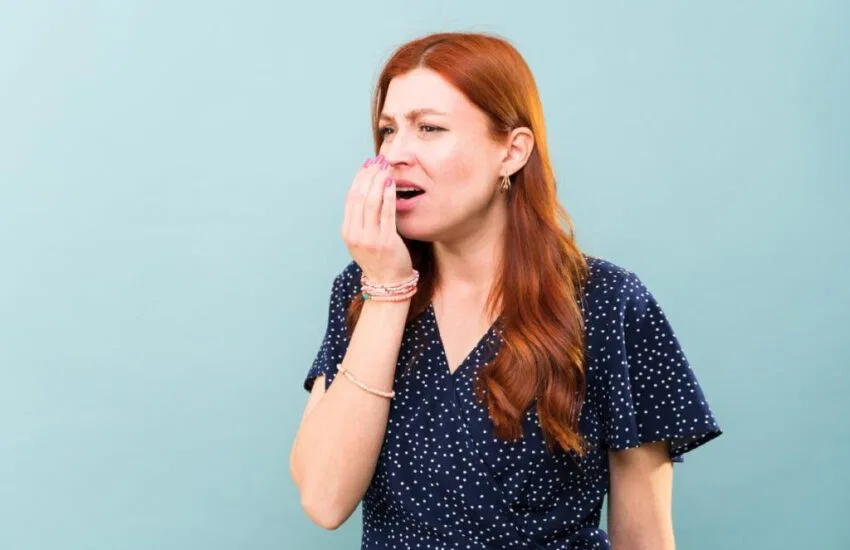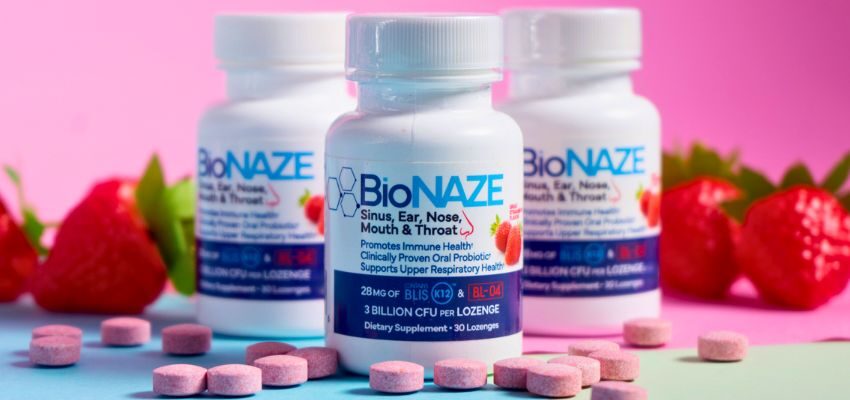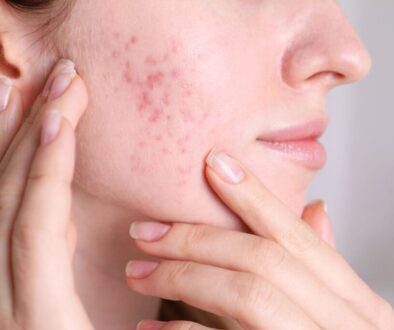5 Best Probiotics For Bad Breath

Published July 25, 2025
Do you feel like bad breath is holding you back in social situations or important moments? Whether it’s a date, a meeting, or just chatting with friends, worrying about your breath can be distracting and frustrating. Quick fixes like mints or gum only mask the problem, leaving you searching for real solutions. The good news? The best probiotics for bad breath can target the root cause, helping you tackle the issue at its source and regain your confidence.
Probiotics are a promising solution for persistent bad breath. These beneficial bacteria restore balance and target the root causes of halitosis. In this article, we’ll explore how probiotics can improve breath freshness. We’ll also learn about the best products available and practical tips to combat bad breath naturally.
Understanding The Root Causes Of Halitosis
Halitosis, or bad breath, is often associated with an imbalance of bacteria in the mouth. Harmful bacteria produce volatile sulfur compounds (VSCs) like hydrogen sulfide and methyl mercaptan. These are the leading causes of unpleasant odors. Poor oral hygiene, gum disease, and dietary choices can worsen the issue. Certain medical conditions can also disrupt the oral microbiome, making the problem worse.
The Link Between Oral Health And Gut Microbial Imbalance
Your mouth and gut are more connected than you might realize. The bacteria in your gut can affect those in your mouth. Conditions like gastroesophageal reflux disease (GERD) or gut bacterial overgrowth can increase sulfur compounds. This may worsen bad breath. To address these issues, focus on balancing both your gut and oral microbiomes.

How Probiotics Fight Bad Breath
Probiotics, often referred to as “good bacteria,” are potent allies in the battle against bad breath. Here’s how they work:
- They introduce beneficial bacteria to your oral microbiome, outcompeting harmful strains.
- They neutralize odor-causing sulfur compounds (VSCs) responsible for bad smells.
- They help prevent plaque buildup and other oral health issues that contribute to halitosis.
5 Best Probiotics For Bad Breath
Combat bad breath at its root with these five highly recommended probiotics, specifically selected for their proven ability to support oral health and restore balance to the bacteria in your mouth. Say goodbye to undesirable odors and hello to a fresher, healthier smile.
Combat bad breath at its root with these five expert-recommended probiotics, specially selected for their proven ability to support oral health and restore balance to the bacteria in your mouth.

Bionaze
Key Ingredients: BLIS K12™ (Streptococcus salivarius K12) and BL-04™ (Bifidobacterium Lactis BL-04).
What Makes It Unique: Bionaze is specifically formulated to promote oral and upper respiratory health. Its dual-action formula fights harmful bacteria in the mouth and throat. It freshens breath and relieves sinus and throat discomfort.
How to Use: Bionaze comes in a convenient lozenge form with a natural strawberry flavor, delivering 3 billion CFU per lozenge. For best results, take one lozenge twice a day after brushing your teeth. Let it dissolve completely in your mouth. This helps beneficial bacteria colonize effectively for the best results.
Hyperbiotics Vital Nutrients PRO Dental Probiotic
Key Ingredients: A blend of 4 clinically studied probiotics, including Streptococcus salivarius BLIS K12 and BLIS M18, plus chelated zinc.
What Sets It Apart: Designed for oral health, this product works directly in the mouth. It combats odor-causing bacteria while helping to prevent cavities and gum inflammation.
How to Use: Enjoy mint-flavored chewable tablets for convenient, effective delivery.
OraTicx Green Breath Probiotic
Key Ingredients: Weissella cibaria CMU
What Makes it Unique: OraTicx is unique due to its lozenge form, which allows direct colonization of oral tissues. It’s powered by the patented oral probiotic strain, oraCMU, developed through years of research. This clinically studied probiotic supports healthy teeth, gums, and immunity. OraTicx targets oral biofilm, soothes throat inflammation, and effectively eliminates bad breath.
Recommended Use: Take 1 to 3 dissolvable lozenges per day. These lozenges provide 8 billion CFU per dose, specially made for targeted oral use. They dissolve slowly to ensure prolonged contact with oral surfaces for better effectiveness.
Great Oral Health Advanced Oral Probiotics
Key Ingredients: A blend of seven powerful probiotics, featuring Streptococcus salivarius strains BLIS K12 and BLIS M18, alongside Lactobacillus strains acidophilus, reuteri, salivarius, paracasei, and thermophilus.
Key Benefits: Promotes a healthy balance of oral flora while helping to reduce plaque, inflammation, and bad breath. Ideal for supporting gum health and ensuring long-lasting oral hygiene.
How to Use: Chewable tablets are easy to use. They fit effortlessly into your daily routine.
NatureWise Oral Probiotics
Key Ingredients: Featuring BLIS K12™ and BLIS M18™, two clinically researched strains of Streptococcus salivarius linked to exceptional oral health. It also includes a blend of beneficial bacteria: L. casei, L. paracasei Lpc-37, L. plantarum, L. reuteri, L. salivarius, B. lactis BI-04, L. rhamnosus GG, B. breve Bb-03, B. infantis, and S. thermophilus.
What Sets It Apart: These sugar-free, chewable mints support fresh breath and better oral hygiene. They improve oral health by nurturing your mouth’s microbiome. Unlike traditional mints, they target harmful bacteria in the mouth and sinuses. They contain no artificial fillers or additives, making them great for sensitive users.
How to Use: Take one chewable mint tablet daily, preferably before meals. It promotes fresh breath, healthy teeth, and gums. Enjoy the mint flavor and an instant boost of freshness.
Choosing The Best Probiotic For Bad Breath
Choosing the right probiotic can feel overwhelming with so many options available. Simplify your decision by focusing on a few key factors, helping you make a confident and informed choice.
Choose Targeted Oral Strains
Choose probiotics with strains like BLIS K12, BLIS M18, Lactobacillus salivarius, or Lactobacillus reuteri. These strains have antimicrobial properties. They help target VSCs and support oral health.
Consider Delivery Methods: Lozenges Vs. Capsules
- Lozenges: Ideal for supporting oral colonization. They dissolve in the mouth, delivering beneficial bacteria right where they’re needed.
- Capsules: Best for addressing underlying gut-related causes of bad breath.
Evaluate Additional Ingredients
Look for formulas free from unnecessary fillers, artificial sweeteners, or common allergens. Natural additives like xylitol can further enhance oral health by reducing cavity-causing bacteria.
Extra Tips For Naturally Managing Bad Breath
Probiotics may be an effective solution for combating bad breath. Paired with healthy habits, they can deliver even greater results.
Prioritize Oral Care
- Brush your teeth two times a day with fluoride toothpaste to keep your mouth clean and fresh.
- Use a tongue scraper to remove biofilm and eliminate odor-causing bacteria from your tongue.
- Floss routinely to get rid of food particles stuck between teeth, which can feed harmful bacteria.
Avoid Triggers Of Bad Breath
- Minimize foods like onions, garlic, and sugary treats that promote the growth of odor-causing bacteria.
- Quit smoking to not only freshen your breath but also protect your oral health and tissues.
Stay Hydrated And Nourished
- Make sure to drink plenty of water to help with dry mouth, which is a typical cause of bad breath.
- Introduce crunchy fruits and vegetables to your diet. They clean teeth, massage gums, and boost saliva for a healthier mouth.
Frequently Asked Questions
Which probiotic strains are most effective for halitosis?
Research shows BLIS K12, BLIS M18, Lactobacillus salivarius, and Lactobacillus reuteri are effective against bad breath. These probiotics reduce sulfur compounds. They also restore a healthy microbial balance in the mouth.
How long does it take for probiotics to improve bad breath?
You may notice improvements within a week, but for lasting results, consistent use over 3 to 4 weeks is recommended.
Can probiotics be used alongside mouthwash or toothpaste?
Yes. Avoid mouthwashes with potent antibacterial agents like chlorhexidine. They kill both good and bad bacteria. This can reduce the probiotics’ effectiveness.
Are there any side effects of using oral probiotics?
Oral probiotics are generally very safe with minimal side effects. Some individuals may experience mild bloating, which typically resolves as the body adapts.
Why Choose Bionaze
Bionaze is a specially crafted oral probiotic designed to support both oral and upper respiratory health. It combines two clinically proven strains—BLIS K12™ (Streptococcus salivarius K12) and BL-04™ (Bifidobacterium Lactis BL-04). Together, they help fight bad breath, support ENT health, and maintain a healthy oral microbiome.
Bionaze comes in easy-to-use lozenges. It works where it’s needed most: your mouth. Trusted by thousands, it’s a science-backed way to improve oral health and freshness.

Fresh Breath Starts With A Healthier Microbiome
Halitosis doesn’t have to be a persistent worry. Probiotics offer a groundbreaking solution for fresh breath by targeting the root cause—microbial imbalances in the mouth. The best probiotics for bad breath can easily become part of your daily oral care routine. Combine probiotics with good oral hygiene, a healthy diet, and proper hydration for fresher breath and renewed confidence. Embrace probiotics as a key part of your self-care routine today!
Ready to take control of bad breath at the source? Discover the power of targeted oral probiotics like Bionaze, designed to support your mouth and throat. Visit Bionaze.com and explore the science behind fresher breath today!
Benefit From The Latest Advancements In Probiotic Science With Bionaze
Bionaze is a proprietary blend of probiotics proven to promote ear, nose, and throat health, improve digestion, and support your immune system. The active ingredients BLIS K12, and BL-04 are considered among the best probiotics according to science.
Get 25% Off Your First Order when you use BIO25 at checkout!

This Content Has Been Reviewed For Factual Accuracy
This content has undergone thorough fact-checking by our team of internal experts. Learn more about the meticulous editorial standard for our website here.
ADVERTISEMENT

About The Author
Hi, I’m Corinne Grace, a proud nursing graduate from Riverside College with a flair for writing. I specialize in health and wellness topics, using my educational background to weave informative and attention-grabbing articles that appeal to a wide variety of readers.




